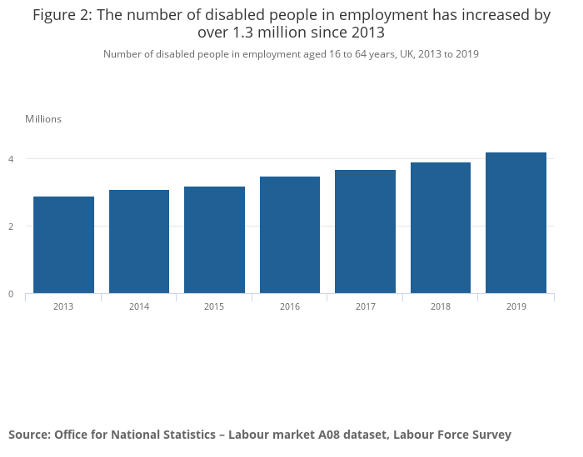Experts fear that the suspension of assisted employment schemes will leave young people with disabilities excluded from a “hypercompetitive” job market.
Young people with learning disabilities will be disproportionately affected by rising rates of unemployment during the Covid-19 recession, due to the suspension of supported internship programmes — academics and SEN teachers have warned.
Mark Capper, Head of Development in the Lifestyles & Work team at the learning disability charity Mencap, said:
“This falling employment rate is really worrying — and with talk of rising unemployment across the board, there is a worry this climate will worsen the barriers to employment and the inequalities that people with a learning disabilities already face.”
Campaign group Disability Rights UK warned that young disabled people entering the labour market during this recession “face the double whammy of being early career workers during a recession, as well as the existing barriers disabled people face trying to find and sustain work.”
Vicky Foxcroft, Shadow Minister for Disabled People, has called on the government to promote the inclusion of young disabled people in the governments Kickstart Scheme — a programme designed to fund job placements for 16 to 24-year olds.
Ms Foxcroft believes safeguards must be put in place “to ensure that disabled and clinically vulnerable people are protected in the workplace from disproportionate job losses.”
Changing Perceptions

Supported internships are structured study programmes in which young people with learning difficulties learn the practical skills necessary for paid employment through work experience with an employer.
However, many companies enrolled in the scheme — who range from hospitality services to retail companies — have stopped accepting students due to Covid-19.
Kanvil Ali, a SEN teacher at Newham College in East London, believes the suspension of these “unique” programmes will worsen the employment prospects of many people with learning disabilities.
“Say that there’s a job going at one department, where you’d normally have about five or ten people apply, you’re now going to have around 30 — and the likelihood is a more able bodied person with more experience under their belt is going to get that job.”
Two years ago, Newham College managed to get 60% of their students on the course into paid employment – this number has fallen to just 15% this year.
“Businesses were haemorrhaging money and had to retract the temporary offers they had made students”, says Ms Ali, who fears this will undo the hard work undertaken to change the perceptions of employers towards the disabled community.
“I’ve had employers who were really sceptical. When we first approached John Lewis, we were told that they’d give our students the opportunity, but definitely couldn’t offer them any jobs. And then you see their mindsets change. Our learners become such valuable members of those departments.”
Mark Capper of Mencap believes it is “time for employers to think differently about who they hire.”
“People with a learning disability can work and want to work, and with the right support they can also make fantastic employees. They just need a chance to show they can do it.”
Helen Evans, a specialist teacher at Derwen College (a Further Education College who offer various in-house vocational placements for SEN learners), is worried students are missing out on valuable experience in a workplace environment.
“Our students haven’t had the opportunity to realise they have skills that are transferable and useful for other situations.”

“We are trying to prove the skills of our students to the general public and organisations who might not consider people with learning disabilities — to not be able to go out and say look at what this person can do has had quite an impact.”
Getting back into work
Seven out of ten disabled people were directly impacted by a loss of income, furlough or unemployment during this pandemic.
Kanvil Ali described how many students who found employment through the supported internship programme at Newham College — many in hospitality and catering industries — have since been made redundant.
She believes many of these people will find it hard to get back into work.
“If that person suffers from high anxiety and mental health issues, and it took so much out of them to go through that interview process, they might not want to go through that process again, it might really demotivate them.”
The disability employment gap
People with disabilities currently have an employment rate which is 29.2% lower than those who are not disabled, according to Scope.
While rates of employment amongst disabled people have been rising consistently since 2013, there are fears that these figures will fall as a result of the pandemic.

New figures from NHS Digital highlight that just 5.6% of people with a learning disability known to their local authority are in paid employment.
Calls for action
SEN teachers are calling on the government to do more to protect the employment prospects of people with learning disabilities.
Helen Evans has called for a standardised interview process across the country, where interviewees are given the questions prior to the interview — she believes this will level the playing field for students with learning difficulties.
“There will be more grilling interviews. It’s going to be a cutthroat business. For our students, especially our autistic students, the interview is a big barrier to employment.”
Disability charity Scope, in an open letter to the Prime Minister, have called on the government to do more to ensure people with disabilities are not left behind as the country recovers from this pandemic.
